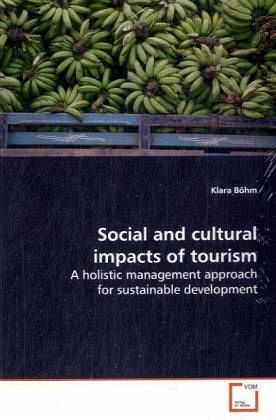
Social and cultural impacts of tourism
A holistic management approach for sustainable development
Versandkostenfrei!
Versandfertig in 6-10 Tagen
39,99 €
inkl. MwSt.

PAYBACK Punkte
20 °P sammeln!
Today tourism constitutes one of the most importantindustries worldwide. Many regions, especially smallisland destinations, are economically dependent ontourism. The negative social and cultural impacts oftourism have long been acknowledged, but in manycases monetary interests have hindered any remedialaction.The focus of this work is set on the understandingand assessment of social and cultural aspects oftourism and their integration into a holisticmanagement approach for sustainable development. Theoverall objective is to mitigate undesirable effectsand enhance the social and cultural benefi...
Today tourism constitutes one of the most important
industries worldwide. Many regions, especially small
island destinations, are economically dependent on
tourism. The negative social and cultural impacts of
tourism have long been acknowledged, but in many
cases monetary interests have hindered any remedial
action.
The focus of this work is set on the understanding
and assessment of social and cultural aspects of
tourism and their integration into a holistic
management approach for sustainable development. The
overall objective is to mitigate undesirable effects
and enhance the social and cultural benefits of
tourism. La Gomera is presented as a case study to
exemplify key issues and illustrate the application
of specific concepts and theories. The work was
written in 2005. In 2008 La Gomera was awarded the
European Charter for Sustainable Tourism in Protected
Areas.
This publication is directed to practitioners and
researchers and provides a contribution for more
sustainable thinking and planning in both social and
cultural terms.
industries worldwide. Many regions, especially small
island destinations, are economically dependent on
tourism. The negative social and cultural impacts of
tourism have long been acknowledged, but in many
cases monetary interests have hindered any remedial
action.
The focus of this work is set on the understanding
and assessment of social and cultural aspects of
tourism and their integration into a holistic
management approach for sustainable development. The
overall objective is to mitigate undesirable effects
and enhance the social and cultural benefits of
tourism. La Gomera is presented as a case study to
exemplify key issues and illustrate the application
of specific concepts and theories. The work was
written in 2005. In 2008 La Gomera was awarded the
European Charter for Sustainable Tourism in Protected
Areas.
This publication is directed to practitioners and
researchers and provides a contribution for more
sustainable thinking and planning in both social and
cultural terms.












